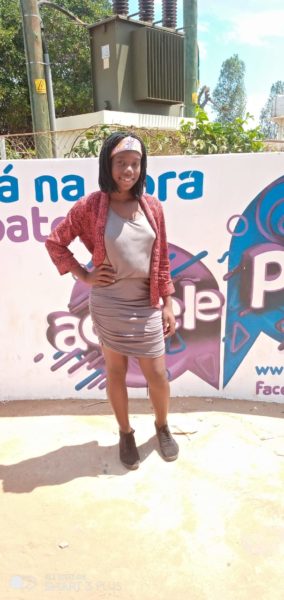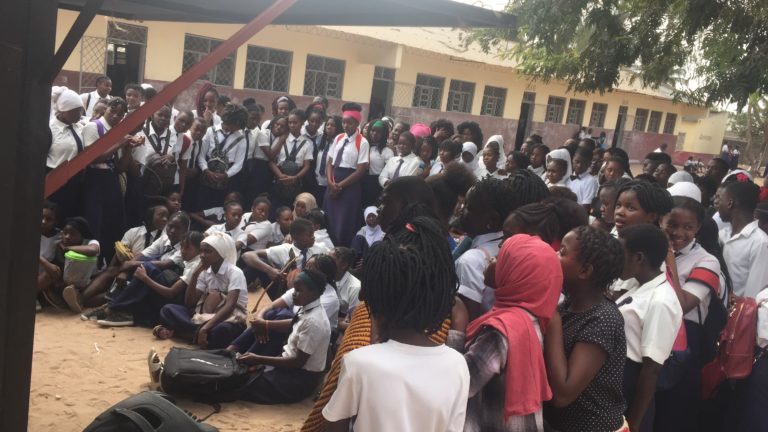This post originally appeared on A360’s learning hub.
By Fuva Muiambo, Communications Officer, PSI/Mozambique

13-year-old Dina Chicova knows she can talk to her friends about almost everything.
Everything, really, except for her questions about all things to do with boys.
In conversations, her friends always push her to date. “It’s important to have a boyfriend, to get married and have children,” they urge.
But that doesn’t feel right for Dina.
Dina has a dream: she wants to be a nurse… or perhaps a police officer. Anything that helps others, she explains. A boyfriend – and worse yet, an unplanned pregnancy, could keep her from reaching those goals.
Still, the pressure from friends felt real and Dina felt she had nowhere to go or no one safe to talk through what felt like life’s big, burning questions.
Across Mozambique, one in two girls will marry and two in five girls will have given birth by age 18. In a country with one of the highest teen pregnancy rates, the impetus remains to resolve the gaps in serving Mozambique’s next generation with the tools and information they need to make the health decisions that shape their lives.
Aquele Papo offers a solution.
Sparking Dialogue, one Film – one Story, at a Time
Powered by PSI Mozambique’s adolescent and youth sexual and reproductive health programs Vale a Pena and Ignite, funded by the Dutch Ministry of Foreign Affairs and developed for adolescents by adolescents, Aquele Papo’s (“The Talk,” in Portuguese) social behavior change campaign aims to spark dialogue among Mozambican youth aged 10-24 around topics that young people have said matter to them, today.

From peer pressure to contraception to what it takes to have “the talk” with parents, the campaign’s feature film, corresponding music video, website and Facebook page, spotlights young Roberto and Maria as they navigate the woes and joys of being an adolescent, including the pressures and questions young people often experience regarding their love life.
The film plays across schools, movie theatres, on a popular Mozambican adolescent TV show and across PSI-facilitated service delivery “Pop-Up” events to reach the ultimate goal: linking young people to the tools and information to make the choices that shape their lives.
In the five weeks since launch, Aquele Papo has reached more than 6,000 young Mozambicans through Aquele Papo’s “Pop Up” events, a combination of interactive sessions for young people to learn about their bodies with the option to engage in youth-friendly contraceptive counseling, if attendees choose. Three in five attendees are girls, and two in five young people who visit the tents will voluntarily adopt a contraceptive method. The campaign partners with other Mozambican organization, offering Aquele Papo as a “solution in a box” that partners can adapt for their adolescent and youth sexual and reproductive health programming.
Change to Believe In

“It was so cool!” Dina exclaimed after watching the film at school during an Aquele Papo event.
She could see herself in Maria, the film’s main character. Brave. Someone who could talk about reproductive health questions with her aunt. Who didn’t give into peer pressure. “I’ll keep doing the same!”
Dina and her girlfriends meandered out from school and into a PSI Pop-Up Event located just down the block. They entered the “Her Body” session where they learn about ways to make menstrual pads with easy to get material. She also learned more about contraception and how it can help her to prevent sexually transmitted infections (STIs) such as HIV/AIDS, plus a baby -before she is ready.
At the end of the event, Dina requested a session with the nurse, where she asked more about contraceptive methods.
It felt good to have someone to talk to – to trust the information she was receiving, and to make the decision for herself.
Just like Maria.
“I decided to take the pill to avoid pregnancy,” Dina said. “All my friends should go to the Aquele Papo tent to get more information and talk about their future.”
Learn more about how Mozambique’s Vale-a-Pena intervention is applying the A360 Blueprint for AYSRH Change to reimagine how young Mozambicans access modern contraception, today.





















